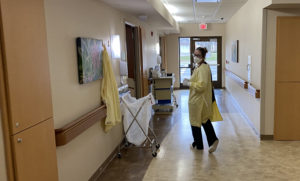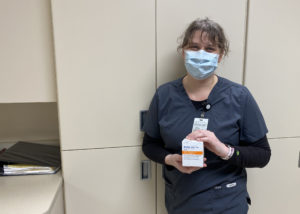In the Fall of 2020, monoclonal antibody therapy was approved by the FDA under the emergency use authorization for the treatment of COVID-19. Monoclonal antibody therapy introduces laboratory-produced molecules that act as substitute antibodies that can restore, enhance, or mimic the immune system’s attack on cells. Not long after the approval from the FDA, the leadership of Ortonville Area Health Services (OAHS) chose to offer the treatment in Ortonville, MN. “After looking at the data, we saw clear benefits,” explained Dr. Allan Ross, Chief Medical Officer at OAHS. “That led to us being one of the first facilities in the area to use monoclonal antibody therapy.” Dr. Ross continued, “I saw an article at the end of December of 2020 showing the number of infusions Massachusetts General Hospital (Harvard Medical School) had done. At that point, we had given more infusions at OAHS!”
Monoclonal antibody therapy is given as an intravenous infusion. It requires about an hour to administer, followed by an hour of observation and monitoring. Patients are told to expect flu-like symptoms over the next 24 hours as the medication kicks the immune system into high gear to fight the COVID virus. The treatment is not a cure; its purpose is to give the immune system the tools to fight the COVID virus more aggressively to help prevent severe illness. “We have given monoclonal infusions in our oncology population in the past to help the body fight infections, and therefore we were familiar with these monoclonal antibody infusions.” said Nicole Lovgren, RN, OAHS Director of Nursing, “We were comfortable with the medication and the process to give these types of medications. We started to give the infusion the week of Thanksgiving in 2020. As of 11/15/2021 (approximately one year from the start), we have given 214 doses at the Ortonville hospital”.
Two hundred fourteen doses may not seem like a lot when you look at it over 12 months. Still, the number becomes even more impressive for a healthcare facility located in a town with a population under 2,000. However, the treatment hasn’t only benefited the local population. According to Lovgren, “We have had numerous patients from around the Twin Cities travel to Ortonville to receive the treatment.” For those unfamiliar, Ortonville is situated on the western Minnesota border, approximately 170 miles from Minneapolis/St Paul. Lovgren continued, “Patients have to drive to wherever a healthcare facility can get them in for the infusion due to Minnesota’s high positivity rate and a limited amount of healthcare infusion appointments right now. They also must be within ten days from the positive test or the onset of their symptoms. The sooner someone can get the infusion, the more likely they are to avoid severe illness from COVID-19”.
The increased patient flow has required a lot of coordination between Northside Medical Clinic and the Hospital. Daily communications on positive COVID tests, potential exposures, and appointments are managed between clinic nursing, pharmacy, and hospital teams. Tracy Escher, Pharmacy Director at OAHS, spoke to this. “In early November, when appointment slots were completely filled for the weekend, our facility increased capacity to be able to provide more infusions, benefitting both our own patients and patients from all over Minnesota.” Increasing capacity led to Ortonville Hospital receiving recognition by the Minnesota Department of Health Surge Coordination Center for going above and beyond to find additional capacity to administer the COVID Antibody Infusions to patients in need. “We work to accommodate appointments seven days a week based on the hospital volumes and staffing structures each day,” added Lovgren. “Every day takes coordination amongst the staff, including utilizing leadership as staffing solutions.” Early in October of this year, when the demand for infusions was outpacing the supply, the closest location with extra monoclonal antibodies was Granite Falls, MN. OAHS CEO Dave Rogers jumped in the car and was able to bring back a few extra doses so more patients could receive treatment. “Our Clinic Nursing, Hospital Nursing, Hospital Pharmacy, and support staff have played a critical role in preventing hospital admissions in Minnesota by providing as many infusions as they can schedule,” said Escher.


